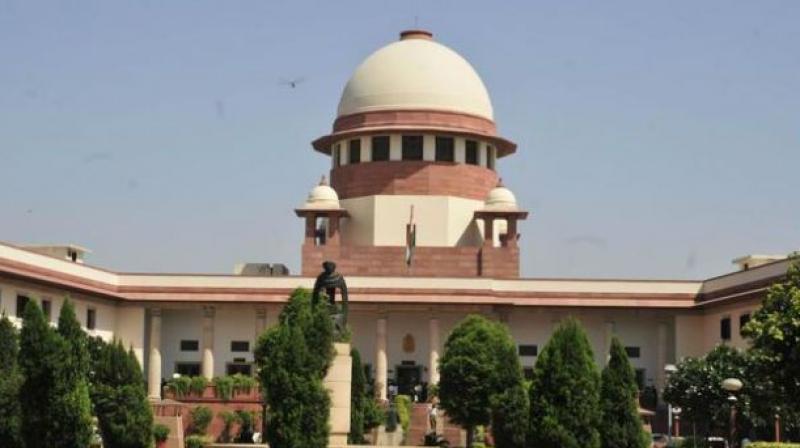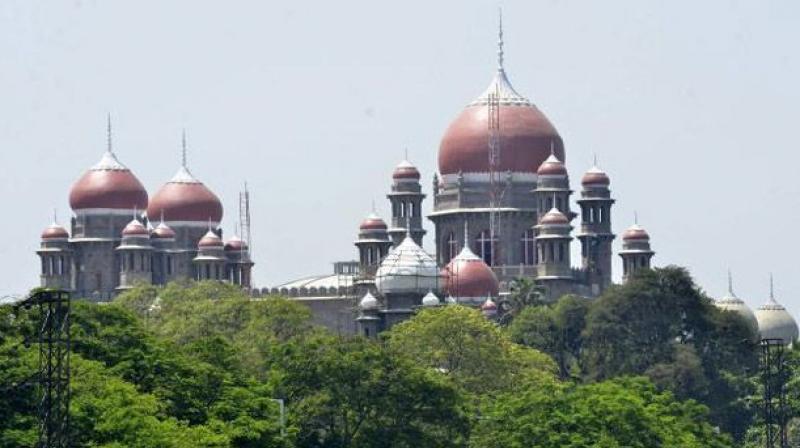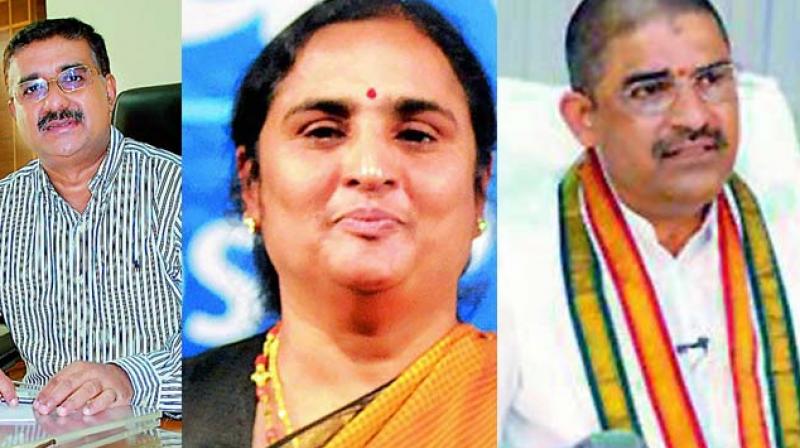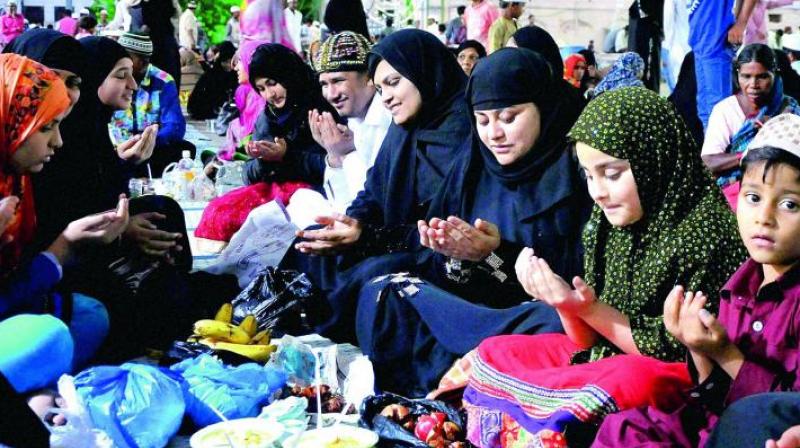Proposal to probe nomination papers gets backing.
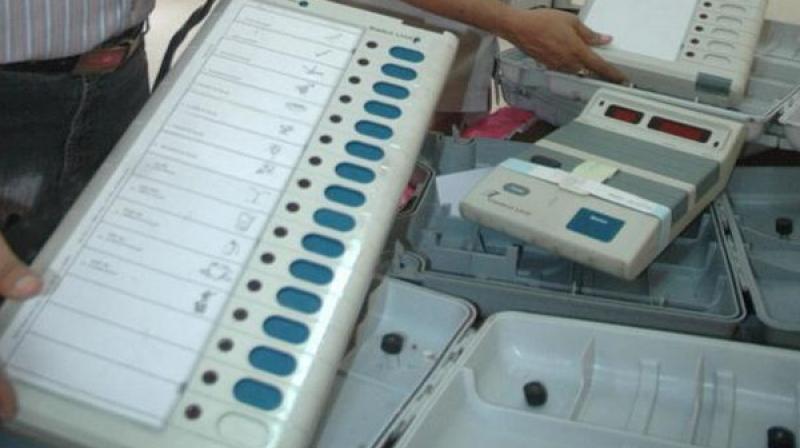
Representational image
By S A Ishaqui
Hyderabad, September 29: Legal experts are of the opinion that
the only way to deter candidates from filing false affidavits during
elections is for intelligence agencies to conduct inquiries into the
antecedents of those who file nomination papers before the announcement
of the list of contestants.
The Election Commission (EC) recently admitted before the Supreme Court that it found itself helpless with regard to the disqualification of candidates who made false declarations at the time of filing nominations. On August 1, 2012, the format of the affidavit appended to the Conduct of Election Rules of 1961 was amended by the Election Commission, making it mandatory for candidates to declare their assets and liabilities, including those of their spouses and dependents, criminal records, and educational qualifications.
The Representation of the People Act (RPA) stipulates that any false declaration or concealment of information in the affidavit constitutes an electoral offence punishable as per the provisions of Section 125(A) of the Act with imprisonment for up to six months, a fine, or both.
However, advocates say that the EC does not have jurisdiction over the falsification of poll affidavits. A person wishing to challenge an affidavit filed by an elected representative must move the court.
Before August 2012, it was under the purview of returning officers to file first information reports (FIRs) and follow up on them. However, the EC amended the regulations, freeing public servants from the task, due to the large number of false affidavits being submitted.
Mr Sarasani Satyam Reddy, a senior lawyer at the Hyderabad High Court, says that RPA Section 125(A) makes the filing of a false affidavit punishable with imprisonment or a fine, or both, but it does not prescribe disqualification of the representative. As per Section 8 of the RPA, an elected representative is only disqualified if he or she is convicted and sentenced to imprisonment for two or more years.
He says that the filing of a false affidavit also constitutes an offence under Section 181 of the Indian Penal Code (IPC). As per the provisions of this Section, the issuance of a false statement by a public servant under oath is an offence punishable with imprisonment for a term of up to three years, as well as a fine. This Section also does not prescribe disqualification.
Mr Satyam Reddy said candidates take advantage of the lax laws and poor law enforcement by filing false affidavits. He says that the EC has asked the Centre, on several occasions, to amend the RPA to increase the term of imprisonment to two years.
Justice P. Lakshman Reddy, a former judge of the AP High Court, says that a preliminary investigation of the claims in the affidavits, by either the police or intelligence agencies, may help deter candidates from malpractices.
He said that the EC should include a provision for the rejection of the candidature of those found to have submitted false affidavits.
He says that the act of making a statement under oath is supposed to be sacrosanct, but many candidates are not concerned with the sanctity of the affidavits. They make false declarations about pending criminal cases and their assets.
Mr Satyam Reddy said that the Constitution has empowered the EC to act in an appropriate manner when the laws contain insufficient provisions to deal with a particular situation regarding the conduct of an election.
Only 10 days needed to check election papers
Justice P. Lakshma Reddy, a former judge of the AP High Court, said that it is not impossible for the Election Commission (EC) to carry out pre-verification of the contents of affidavits filed by candidates if it sets aside a period of 10 days for the task.
He said that subsequent to the issuance of an election notification, the official machinery of the election is under the control of the EC. It can seek assistance from the departments of revenue, registration, transport and police to verify the correctness of the contents of affidavits.
The former judge said that the police department, including its intelligence and special branches, can be used to verify if candidates have any criminal cases pending against them. The revenue and registration departments can supply records of properties owned by candidates, and the transport department can supply records of the vehicles owned by them.
Justice Reddy said that the amendment of laws to either enhance punishment for the filing of false affidavits or to provide for the disqualification of candidates is not an easy task as it will be difficult for all political parties to arrive at a consensus. He said that pre-verification of affidavits by the EC is more likely to yield positive results.
A police officer from the Intelligence department, on condition of anonymity, said that the police can easily verify criminal antece-dents of candidates as most records are available with the department. The police can also make use of its intelligence network.
He said that if the EC introduces a pre-verification process, then the department will have to identify officers for the verification of criminal records.
He said that elections are countermanded in case of the death of a candidate of recognised political parties, but earlier they would even be countermanded in case of the death of an independent.
What the courts said
The Election Commission (EC) recently admitted before the Supreme Court that it found itself helpless with regard to the disqualification of candidates who made false declarations at the time of filing nominations. On August 1, 2012, the format of the affidavit appended to the Conduct of Election Rules of 1961 was amended by the Election Commission, making it mandatory for candidates to declare their assets and liabilities, including those of their spouses and dependents, criminal records, and educational qualifications.
The Representation of the People Act (RPA) stipulates that any false declaration or concealment of information in the affidavit constitutes an electoral offence punishable as per the provisions of Section 125(A) of the Act with imprisonment for up to six months, a fine, or both.
However, advocates say that the EC does not have jurisdiction over the falsification of poll affidavits. A person wishing to challenge an affidavit filed by an elected representative must move the court.
Before August 2012, it was under the purview of returning officers to file first information reports (FIRs) and follow up on them. However, the EC amended the regulations, freeing public servants from the task, due to the large number of false affidavits being submitted.
Mr Sarasani Satyam Reddy, a senior lawyer at the Hyderabad High Court, says that RPA Section 125(A) makes the filing of a false affidavit punishable with imprisonment or a fine, or both, but it does not prescribe disqualification of the representative. As per Section 8 of the RPA, an elected representative is only disqualified if he or she is convicted and sentenced to imprisonment for two or more years.
He says that the filing of a false affidavit also constitutes an offence under Section 181 of the Indian Penal Code (IPC). As per the provisions of this Section, the issuance of a false statement by a public servant under oath is an offence punishable with imprisonment for a term of up to three years, as well as a fine. This Section also does not prescribe disqualification.
Mr Satyam Reddy said candidates take advantage of the lax laws and poor law enforcement by filing false affidavits. He says that the EC has asked the Centre, on several occasions, to amend the RPA to increase the term of imprisonment to two years.
Justice P. Lakshman Reddy, a former judge of the AP High Court, says that a preliminary investigation of the claims in the affidavits, by either the police or intelligence agencies, may help deter candidates from malpractices.
He said that the EC should include a provision for the rejection of the candidature of those found to have submitted false affidavits.
He says that the act of making a statement under oath is supposed to be sacrosanct, but many candidates are not concerned with the sanctity of the affidavits. They make false declarations about pending criminal cases and their assets.
Mr Satyam Reddy said that the Constitution has empowered the EC to act in an appropriate manner when the laws contain insufficient provisions to deal with a particular situation regarding the conduct of an election.
Only 10 days needed to check election papers
Justice P. Lakshma Reddy, a former judge of the AP High Court, said that it is not impossible for the Election Commission (EC) to carry out pre-verification of the contents of affidavits filed by candidates if it sets aside a period of 10 days for the task.
He said that subsequent to the issuance of an election notification, the official machinery of the election is under the control of the EC. It can seek assistance from the departments of revenue, registration, transport and police to verify the correctness of the contents of affidavits.
The former judge said that the police department, including its intelligence and special branches, can be used to verify if candidates have any criminal cases pending against them. The revenue and registration departments can supply records of properties owned by candidates, and the transport department can supply records of the vehicles owned by them.
Justice Reddy said that the amendment of laws to either enhance punishment for the filing of false affidavits or to provide for the disqualification of candidates is not an easy task as it will be difficult for all political parties to arrive at a consensus. He said that pre-verification of affidavits by the EC is more likely to yield positive results.
A police officer from the Intelligence department, on condition of anonymity, said that the police can easily verify criminal antece-dents of candidates as most records are available with the department. The police can also make use of its intelligence network.
He said that if the EC introduces a pre-verification process, then the department will have to identify officers for the verification of criminal records.
He said that elections are countermanded in case of the death of a candidate of recognised political parties, but earlier they would even be countermanded in case of the death of an independent.
What the courts said
- The Election Commission recently told the Supreme Court that it had written to successive governments at the Centre 43 times to make an amendment to increase the punishment for candidates found guilty of filing false affidavits.
- The Madras High Court found that courts were empowered to disqualify the election of a candidate if an affidavit filed by him or her before the Returning Officer contained incorrect, incomplete, false or one-sided information.
- The Madras High Court observed that “The requirement to furnish full information is not intended to be an empty ritual performed by a non-believer, but is intended to be sanctimonious. Therefore, a candidate is not entitled to just satisfy the letter of the law and make it sacrilegious.”

